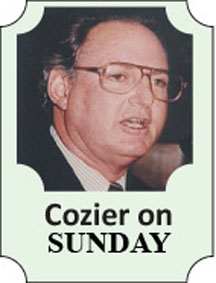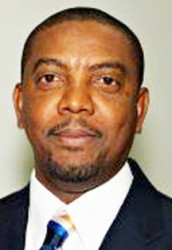THE euphoria that swept through the cricketing Caribbean following last Sunday’s men’s team’s victory snatched from the jaws of defeat in the World T20 final in Kolkata has been accompanied by the heated, long-running debate over the future of the West Indies Cricket Board (WICB).
 The two were simultaneously linked at the presentation formalities by captain Darren Sammy’s impassioned denunciation of the WICB as he received the trophy for the second time in three tournaments. Dwayne Bravo’s subsequent descriptions of the WICB as ‘the most unprofessional board in the world’ and president Dave Cameron as ‘immature’, ‘small minded’ and ‘arrogant’ added fuel to the fire.
The two were simultaneously linked at the presentation formalities by captain Darren Sammy’s impassioned denunciation of the WICB as he received the trophy for the second time in three tournaments. Dwayne Bravo’s subsequent descriptions of the WICB as ‘the most unprofessional board in the world’ and president Dave Cameron as ‘immature’, ‘small minded’ and ‘arrogant’ added fuel to the fire.
They were combative words that drew the inevitably sharp responses from Cameron and his vice-president Emmanuel Nanthan.
Cameron released a statement on behalf of the WICB, apologizing to the ‘millions of fans who witnessed it…for what could be deemed inappropriate comments’ by Sammy. He went further with a typically biting tweet to the captain: ‘When is the last time a critic paid one of your bills? Always remember that when you start to give your energy.’
Nanthan termed Sammy’s reproach ‘irrelevant, demeaning, insulting and unfortunate’. A few days later, perhaps mindful of Sammy’s widespread popularity, he claimed he wasn’t really criticizing him as they always had a father and son relationship. As manager of the Windward Islands youth team, he asserted that he had gone against the selectors and the president of the Windwards board to get Sammy, then a reserve, into the 11. It was a baffling non-sequitur.
As Cameron was making his unsolicited apology and dispatching his tweet, the St.Lucia government was preparing for the return of their two nationals in the champion team, Sammy, and opener Johnson Charles. The culmination was the renaming of the Beausejour stadium, venue for international cricket, the Darren Sammy National Cricket Stadium. The size of celebrating crowds left no doubt over Sammy’s status in his native island.

So it mostly was throughout the 11 territories, from Guyana in the south to Jamaica in the north, whose common passion for over 100 years has been the game that unites them and for which they have been universally recognized for excellence and the exciting brand of their play.
Some of the West Indies legends during the glorious period between 1976 and 1995, Sir Viv Richards and Sir Andy Roberts the most prominent, sided with Sammy. So did Ramnaresh Sarwan, a player of more recent vintage.
They repeated the calls for an overhaul of the WICB’s structure that go back to a report on its governance, prepared by a panel headed by former Jamaica prime minister P.J.Patterson, in 2007.
‘Change must be effected urgently,’ Patterson’s report, commissioned by the WICB, stated. ‘The status quo is not an option.’
Nine years on, the status quo has remained basically the same under boards presided over by St.Lucian diplomat Julian Hunte and Cameron, the 47-year-old Jamaican financier. The latest report, jointly formed by the WICB and the Caricom (Caribbean governments) sub-committee of cricket, was prepared by a panel under principal of the University of the West Indies (UWI) Barbados campus, Dr.Eudene Barriteau. It recommended the ‘immediate dissolution and the resignation of its members to be replaced by a differently constituted board.
It was, predictably, rejected, sparking an on-going confrontation between Cameron and Grenada prime minister Keith Mitchell, head of the Caricom group. It remains a contentious issue.
The day after the Kolkata phenomenon, Mitchell reiterated his view, and that of other Caricom leaders, that there is little hope of a turnaround in the overall decline of the game in the Caribbean unless the attitude at board level changes.
‘There must be serious changes in the way the board operates,’ he said. ‘The structure that breeds the mindset we are now seeing must change.’
In a lengthy, two-part interview with Nagraj Gollapudi on the ESPNcricinfo website on the eve of the West Indies semi-final against India, Cameron spoke of the advances he claimed were made during his successive terms in office.
There was a detailed background to the withdrawal of the team from the tour of India in October 2014 for which the Board of Control for Cricket in India (BCCI) held the WICB responsible and the BCCI’s recent agreement to send its team to the Caribbean for four Tests in July and August.
He spoke of the financial benefits of the Caribbean Premier League (CPL) that started during his first term after being initially licensed for 50 years to the New York merchant bank, Verus International, during Hunte’s closing tenure.
He told Gollapudi that his relationship with the players ‘is fine, as between any president and his players’. More realistically, he added: ‘Obviously I would have liked it to be a little bit different at this point in time.’
He said he was deliberately staying in a hotel in Mumbai not with but next door to the team’s.
Explanation? ‘Sometimes players get a little nervous when the management is around them. They probably feel a little defensive. I don’t want them to feel like I am spying on them.’
‘No, man, the relationship is good,’ he reiterated. ‘It is where it needs to be. I’m the president of the organisation. They are the stars and they know that the WICB is supporting them in winning these tournaments. We are happy with that.’
There was much else besides. Not everything corresponded with the record.
‘At no time did I aspire to be president,’ he declared, adding that after 14 years as a WICB director and vice-president ‘they asked me to lead the sport’.
His own account at the time tells a different story. As he stood against the incumbent Hunte for the post in March 2013, he acknowledged that it was a ‘long process’.
‘I travelled the length and breadth of the Caribbean, from Kingston, Jamaica to Georgetown, Guyana to be able to address the concerns of our stakeholders,’ he said after his election. The balance was swung his way, reportedly by the votes of three delegates who flouted the mandate of their member board directors to back Hunte.
When he ran for a second term in March 2015, this time against Garner, the Jamaica Cricket Association (JCA) directors chose to support the giant Barbadian, one of the famed band of fast bowlers of the 70s and 80s. A meeting of the general membership soon overturned the decision and reverted to Cameron, one of their own. It was enough for him to retain the presidency.
It all confirmed what he boasted in a tweet during his first term, when he was coming under increasing pressure to quit.
“They’ve criticised you. They’ve doubted you. They’ve lied on you. They’ve done all they can do, but one thing they can’t do is stop you,” he wrote.
So far no one has been able to.









